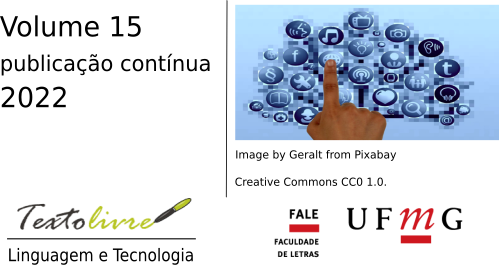Corpus de legendas de animes (CorLeAni)
DOI:
https://doi.org/10.35699/1983-3652.2022.38695Palavras-chave:
Anime, Corpus, Fansubber, Fansubs, LegendagemResumo
Reportamos, neste artigo, o processo de compilação de um corpus formado por legendas de animes em português brasileiro, aqui denominado Corpus de Legendas de Animes (CorLeAni). O CorLeAni, atualmente com cerca de 1 milhão de palavras, foi compilado seguindo o suporte teórico-metodológico dos Estudos da Tradução Baseados em Corpus. A compilação deu-se ao longo de dois Projetos de Pesquisa de Iniciação Científica de Ensino Médio (PIBIC-EM), 2019-2020 e 2020-2021, com bolsa do Instituto Federal Goiano-Campus Campos Belos. Reconhecendo que as fansubs apresentam um grande potencial para discussões e estudos no âmbito audiovisual, disponibilizamos o CorLeAni de forma gratuita, podendo ser utilizado em futuras pesquisas com focos linguístico e tradutório.
Downloads
Referências
BAKER, M. Corpora in Translation Studies: An Overview and Some Suggestions for Future Research. Target. International Journal of Translation Studies, v. 7, n. 2, p. 223–243, jan. 1995. DOI: 10.1075/target.7.2.03bak. Disponível em: https://benjamins.com/online/target/articles/target.7.2.03bak. Acesso em: 23 mai. 2022.
BAKER, M. Corpus-based translation studies: the challenges that lie ahead. In: SOMERS, H. (Ed.). Terminology, LSP and translation: studies in language engineering in honour of Juan C. Sager. Amsterdam/Philadelphia: John Benjamins Publishing Company, 1996. p. 177–186.
BERBER SARDINHA, T. Linguística de corpus. Barueri: Editora Manole, 2004.
BOGUCKI, L. Amateur subtitling on the internet. In: DÍAZ CINTAS, J.; ANDERMAN, G. (Org.). Audiovisual translation: language transfer on screen. Grã-Bretanha: Palgrave Macmillan, 2009. p. 49–57.
CAMARGO, D. C. de. Metodologia De Pesquisa Em Traducao E Linguistica De Corpus. São José do Rio Preto, SP: Laboratório Editorial do IBILCE/UNESP, 2007.
DÍAZ CINTAS, J.; MUÑOZ SÁNCHEZ, P.; MOURA, W. H. C. Fansubs: Tradução Audiovisual em um Ambiente Amador. Cadernos de Tradução, v. 42, n. 01, p. 1–26, mai. 2022. DOI: 10.5007/2175-7968.2022.e80264. Disponível em: https://periodicos.ufsc.br/index.php/traducao/article/view/80264. Acesso em: 24 mai. 2022.
DÍAZ CINTAS, J.; NEVES, J. Taking stock of Audiovisual Translation. In: THE JOURNAL OF SPECIALISED TRANSLATION (Org.). Audiovisual Translation: taking stock. UK: Cambridge Scholars Publishing, 2015. p. 1–7.
DÍAZ-CINTAS, J.; REMAEL, A. Audiovisual translation: subtitling. Manchester, UK ; Kinderhook, NY: St. Jerome Pub, 2007.
DÍAZ-CINTAS, J.; SÁNCHEZ, P. M. Fansubs: Audiovisual Translation in an Amateur Environment. The Journal of Specialised Translation, n. 6, p. 37–52, 2006.
FERRER SIMÓ, M. R. Fansubs y scanlations: la influencia del aficionado en los criterios profesionales. Puentes, v. 6, p. 27–44, 2005. Disponível em: http://wpd.ugr.es/~greti/revista-puentes/pub6/04-Maria-Rosario-Ferrer.pdf. Acesso em: 23 mai. 2022.
LUYTEN, S. B. Mangá e animê – Ícones da Cultura Pop Japonesa. Fundação Japão em São Paulo, p. 1–11, 2014. Disponível em: https://fjsp.org.br/estudos-japoneses/artigo/manga_anime_sonia_luyten/. Acesso em: 23 mai. 2022.
MCENERY, T.; WILSON, A. Corpus linguistics: an introduction. Edinburgh: Edinburgh Univ. Press, 2001. (Edinburgh textbooks in empirical linguistics).
MOREIRA, H.; CALEFFE, L. G. Metodologia de pesquisa para o professor pesquisador. Rio de Janeiro: Lamparina, 2008.
NETO, A. B. Mangás e Animês: A cultura pop japonesa no Brasil. 2017. Trabalho de Conclusão de Curso (Licenciatura em História) – Universidade Estadual de Montes Claros – UNIMONTES, São Francisco.
PEREIRA, I. D. Cultura pop Japonesa no Brasil. Temática, v. 13, n. 8, p. 46–59, 2017. Disponível em: https://periodicos.ufpb.br/ojs2/index.php/tematica/article/view/35730. Acesso em: 23 mai. 2022.
SATO, C. A. A cultura popular japonesa: animê. In: LUYTEN, S. M. B. (Org.). Cultura Pop Japonesa: Mangá e Animê. 1. ed. São Paulo: Hedra, 2005. p. 27–42.
Downloads
Publicado
Edição
Seção
Licença
Copyright (c) 2022 Daniel Gomes da Cunha, Janailton Mick Vitor da Silva

Este trabalho está licenciado sob uma licença Creative Commons Attribution 4.0 International License.
Este é um artigo em acesso aberto que permite o uso irrestrito, a distribuição e reprodução em qualquer meio desde que o artigo original seja devidamente citado.











